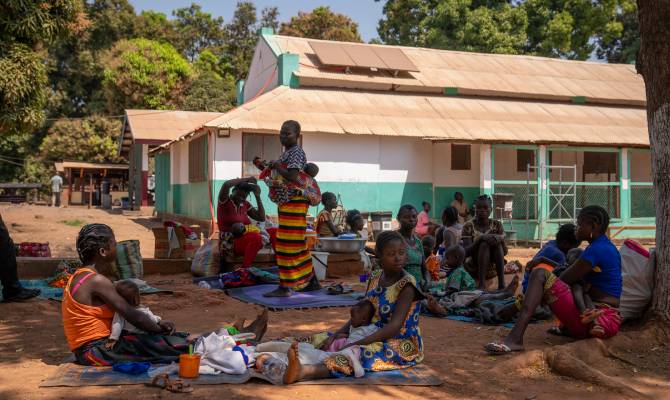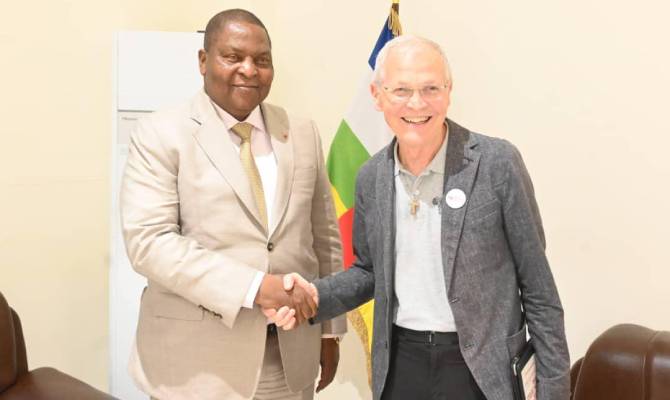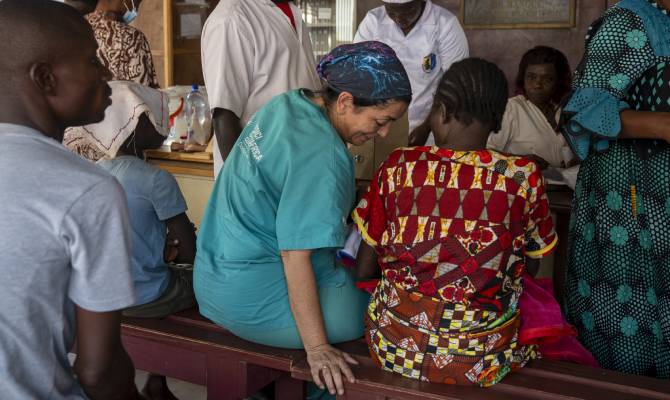A free referral system that enables access to services—particularly delivery care—while also revitalizing the entire healthcare system.
It is all expressed in a name, but above all in a goal: “Support to Essential Maternal and Child Health Services for the Most Vulnerable Population in the Bossangoa Health District.” This initiative, funded by the Italian Ministry of Foreign Affairs and International Cooperation (MAECI) through the Italian Agency for Development Cooperation (AICS) and implemented by Doctors with Africa CUAMM, was recently concluded in Bossangoa, Central African Republic. Launched in September 2024, the project, after one year of activity, has already yielded concrete and meaningful results through a number of strategic actions outlined below:
Transport and Referral System
Ensuring free healthcare, together with the introduction of a free referral system to and from the Regional Hospital of Bossangoa, was crucial to facilitating access to maternal health services, particularly delivery care.
Between September 2024 and July 2025, an 11.9% increase was recorded compared to the same period of the previous year.
The referral system represents one of the most significant outcomes of the intervention in the Bossangoa Health District. The availability of free transportation to and from the hospital not only improved access to services, but also strengthened the population’s perception of the system’s efficiency and usefulness. The hospital has in fact seen a growing influx of emergencies and complex cases requiring advanced care: a indicator is the rate of caesarean sections, which account for 19% of assisted deliveries. At the same time, the number of referrals has exceeded expectations, with a monthly average of 105 cases—eight times the initial level.
Starting from October, CUAMM carried out 29 community sensitization sessions, focusing particularly on the free services available at the Regional University Hospital of Bossangoa.
Medicines and Consumables
Among other key activities, the project ensured the procurement and transport of medicines, reagents, and consumables needed for the management of obstetric and neonatal cases—including emergencies—complementing government supplies.
It also secured the purchase and distribution of essential equipment for adequate obstetric and neonatal care across 2 Health Centres and 12 Health Posts. Specifically: a 14-piece surgical instrument set, a weighing scale, a blood pressure monitor, a manual suction device, and a neonatal resuscitation ambu bag.
In each facility, a tailored training session was conducted to familiarize healthcare staff with the new tools and to contextualize their use within maternal and child health protocols. In total, 18 health workers were trained, including 15 traditional birth attendants and 3 midwifery assistants.
Training and Monitoring
The presence of CUAMM technical staff in the maternity ward of the hospital helped strengthen the skills of local personnel in detecting and correctly recording obstetric emergencies. Between September 2024 and July 2025, data show an increase of nearly 25% in managed obstetric complications, confirming the fundamental impact of the intervention in preventing and reducing maternal mortality and morbidity in the District.
Moreover, interventions that were previously not fully free—and whose direct and indirect costs represented a major barrier for women, even in emergencies—such as caesarean sections or blood transfusions, can now be provided thanks to the project’s support.
Since January, five community blood donation campaigns were organized, mobilizing 328 donors. All community activities organized allowed us to engage and reach an overall number of 2,382 people.
Equipment and Maintenance
Special attention was given to improving and maintaining equipment and facilities for obstetric and neonatal care, including those required for emergency management at the hospital. Notably, renovation work on an old building—soon to house a new maternity ward—and the construction of an operating block dedicated to gynecological and obstetric surgery are nearing completion.
Support to Staff and Management of Hospital Services
As part of routine activities, CUAMM supports the management of the Bossangoa Hospital in maintaining a motivated and stable health workforce, indispensable for the proper functioning of maternity, neonatal, and related services. This includes covering salaries and/or monthly incentives.
In parallel, CUAMM has taken over the management of the hospital kitchen and, under the direction of ward heads, ensures the provision of two daily meals to all hospitalized patients.
Consolidating Prospects
The commitment continues and strengthens, still with the support of Italian Cooperation, through the project “Promoting Access to Health and Nutrition Services for Women and Children in the Bossangoa Health District.”
Interventions will operate at multiple levels:
- At hospital level, by supporting management structures, strengthening staff skills, and providing medicines and equipment.
- At community level, by promoting initiatives to disseminate good practices in health and nutrition, and to facilitate access to obstetric, neonatal, and acute malnutrition treatment services.
Additionally, the project will promote screening campaigns for malnutrition among children under five and pregnant/breastfeeding women, as well as blood donation campaigns.
Continuous training and supervision of traditional birth attendants will also be ensured, with a focus on safe pregnancy and delivery, pre- and post-natal services, and the timely identification and referral of complications.





